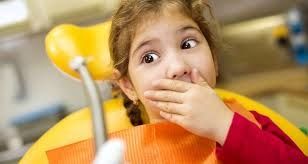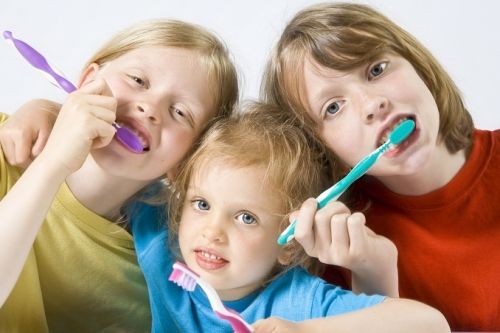Children And The Dentist
Children And The Dentist
There can be various reasons why a child has developed fear for the dentist. Their own past experiences, but more often the stories they hear from other children are the cause. Or (usually) because the parents are afraid and unconsciously teach their children that going to the dentist is something to be afraid of. Children are very sensitive to their parents feelings and fears. If you have fear for the dentist, it is advised that another adult, who is not afraid, accompanies your child to the dentist.

Even so important: don’t tell your child weeks in advance that he will go to the dentist. The shorter the period before the appointment, the better.
The dentist should, just before, and during, the treatment, explain shortly what will happen in simple words. This will create a structure for your child and therefore trust. It’s important that the dentist also creates a peaceful atmosphere during the treatment and that the duration of the treatment is relatively short.
It is also wise when the dentist and your child make the agreement that your child may raise his hand when he wants a break from the treatment. But after the break the treatment will be continued. This way your child will feel more save because he feels in control.


Don’t tell your child anything that is not true. Your child may ask questions like ‘will it hurt?’, ‘will the dentist use a drill?’. Parents feel the urge to reassure their children. But don’t make promises to your child that can’t be guaranteed, for instance ‘don’t worry, you won’t feel a thing’. When it actually does hurt, your child will feel betrayed, loses his confidence in you and the dentist, and will be more afraid the next time. The best thing you can do, instead of giving answers yourself, is to make a list of the questions your child wants to ask to the dentist.
And ask them together before the treatment starts. After the treatment, reward your child with a small gift, or do some nice activity together. Don’t pay unnecessary attention to the treatment afterwards. Even compliments like ‘you did very well’ or ‘you were such a big boy’ may imply that the dentist treatment was frightening
By the way, research shows that just 14% of children between 4 and 11 years are afraid of the dentist. Research also shows that the younger the child gets used to go to the dentist, the less fear he will develop. So start early. When your child turns two, bring him along to your own dentist appointment. At least two times. Your child will develop more confidence being familiar with the dentist’s office and the people there. The next time you go to the dentist, tell your child that the dentist will also examine his teeth this time. It’s best that your child is at least four years old when he has his first dental treatment.
Sibel Köklü, MSc.
Clinical Psycologist
 EN
EN